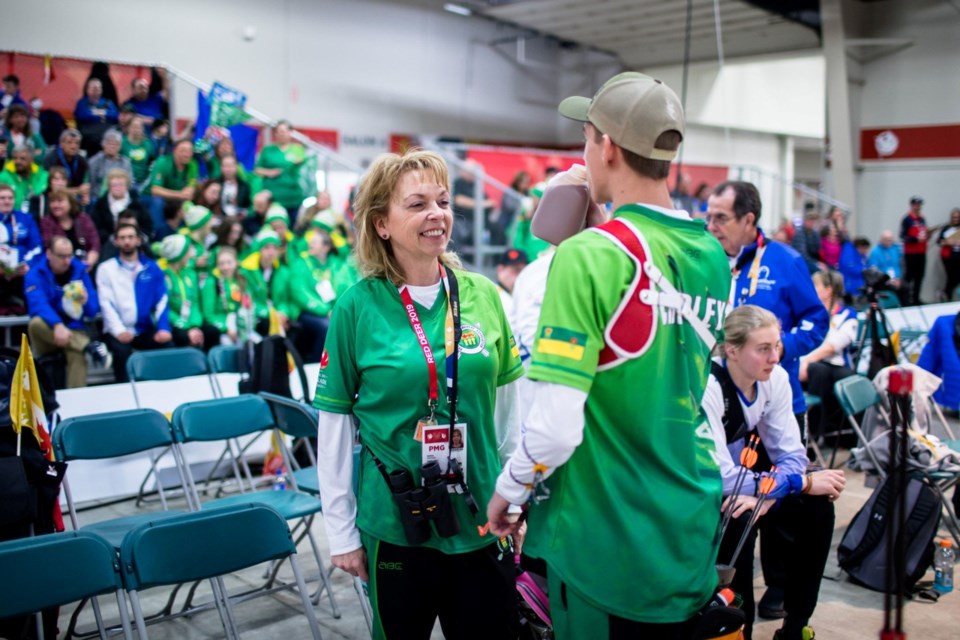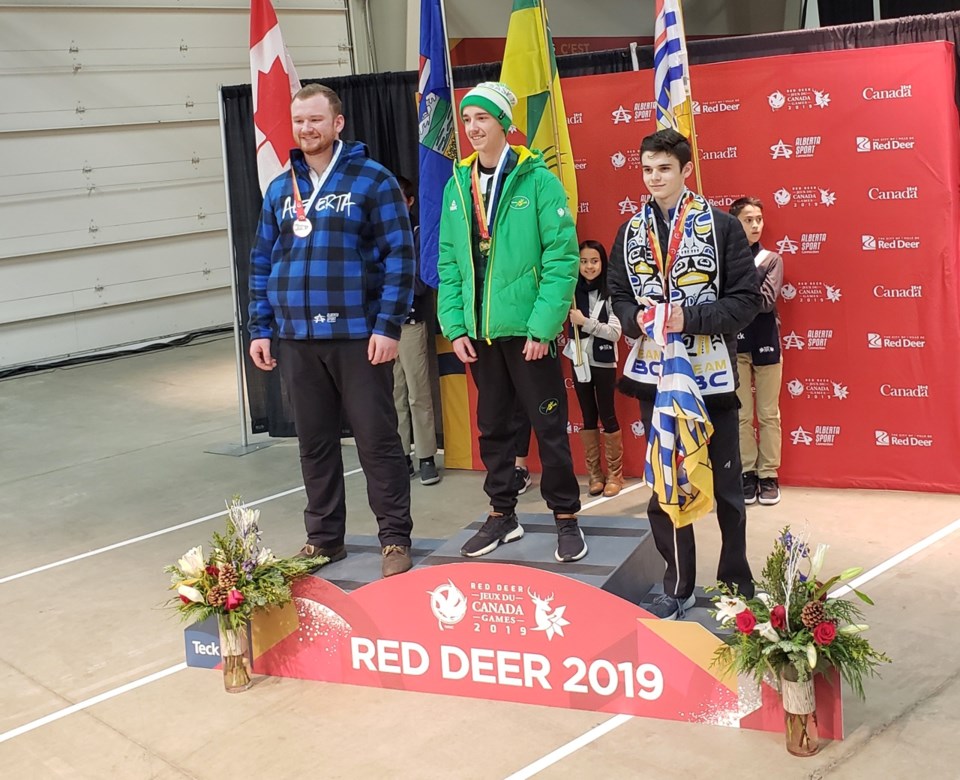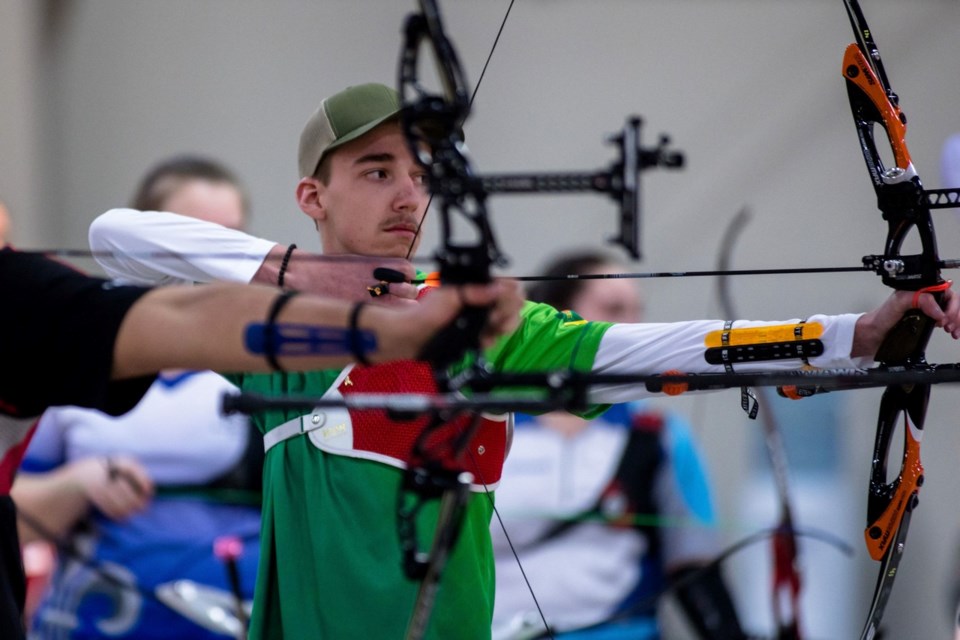People in Estevan, and in Canada’s archery community, know how talented Hunter Chipley is with a bow and arrow.
At age 17, he has already competed on the national stage and has won championships.
But now he is gaining recognition for his abilities beyond the archery community.
Chipley, 17, was a star at the recent Canada Winter Games in Red Deer, Alta. He won a gold medal in the men's individual recurve event and a silver medal in the team recurve mixed event, alongside teammate Jay Gegner of Regina.
Then, just hours before the Games ended, Chipley found out he would be Team Saskatchewan’s flag bearer for the closing ceremonies.
He led a team of 215 athletes and 96 coaches, managers and support staff into the venue for the ceremonies, which were held at the Enmax Centrium on March 2. The event aired on TSN/RDS.
“I didn’t think they would pick me, because there was 200-something athletes, and a variety of athletes there,” Chipley said in an interview with the Mercury.
Once they had walked into the venue, Chipley was presented with a Saskatchewan flag that he held onto for the rest of the ceremonies.

Not only was he singled out for his success in the sport, but he was also chosen for having a positive attitude.
He recognizes there were a lot of talented athletes to choose from.
Chipley was among the contenders in men’s individual recurve from the outset. After the first round, he was in second place with a score of 573, just seven points behind first place finisher Aaron Cox of Alberta. He also had a score of 573 in the second round, which was nine points behind Cox.
It’s a pretty good score, he said, as it is out of 600 possible points. Archers are awarded points based on their proximity to the bull’s-eye with their arrows.
Chipley finished the qualification round in second spot with a score of 1,146, which earned him a bye to the quarter-finals.
He defeated New Brunswick’s Luc Arseneau Chiasson 6-0 in the quarters, and Ontario’s Reece Wilson-Poyton 7-3 in the semifinal round, setting up the showdown with Cox in the final, which Chipley won 6-4.
“You shoot a round, and if you win it, you get two points, and if you tie, you get one each,” he said.
Archers get to shoot three arrows in each round in the playoffs. Ten points are awarded for a bull’s-eye, and Chipley said a score of 29 is really good.
The first archer to win three rounds wins.
It means he could have as few as nine arrows to shoot in a matchup, which was the case against Arseneau Chiasson, or closer to 20, which happened against Cox.
The final against Cox was a tough match between the top-two ranked competitors, but it was a lot of fun.
“In one of the 600 ends (in the preliminary round), I was shooting beside him, and it was a good time. We’d talk and have fun. But we respected each other. If he shot a good round, or I shot a good round, we’d say it was a good round to each other.”
Cox is 19, so it was his last year as a junior, while it was Chipley’s first year as a junior.
The following day, he added the silver medal to his tally.
The Saskatchewan entry of Chipley and Gegner was among the best throughout the competition. They were second after the initial qualifying round with a score of 1,083 points, and finished third in Round 2 with 1,073 points. Their two-round total of 2,156 points left them in third spot overall.
“There were lots of strong shots, and holding everything together,” said Chipley. “But it’s really hard. Before you know where you’re placed for medals and things like that, there are lots of nerves because you want to get into the medal matches, but as soon as Jay and I got into the gold and silver match, we relaxed.”
They knew they were going to leave with a medal they had earned together.
In the quarterfinals, they defeated sixth-seeded Manitoba 6-4, and then knocked off Ontario, the No. 2 team, 6-4 in the semifinal round, putting them in the final against Quebec, which they lost 6-2.
This was the first time he had competed with her.
“We get along pretty well,” he said. “We both know how to calm each other down, and stuff like that, and make each other feel good about ourselves,” said Chipley.

Chipley said he worked really hard to be a contender at the Games, and he was happy with how he shot in Red Deer. There were some very talented young archers at the Games, and he was happy to come home with two medals.
“We’re all shooting really high scores, and really consistent scores, so the competition was pretty hard,” said Chipley.
He believes his previous experience at national events was a big boost.
“It’s a multi-sport event,” he said. “So there’s a whole bunch of different sports here. We all stay in one village and stuff like that. But it helped with calming myself , and knowing my steps, and what I have to do.”
Archery is truly a family affair for the Chipley clan: Hunter has been training in the sport since the age of two, his older sister Jade is a two-time archery team alumni of the Canada Games, his father Ken has twice coached the archery team at a Canada Games, and his mother Monai Wanner was team manager for archery.
He credits his parents and the Estevan Archery Club for his development in the sport. He and his father have gone to Toronto for competitions and other events, allowing him to learn from the best in the country.
Wanner was pleased with not only the amount of work that her son put in, but with all of the archers on Team Sask.
“They’ve all been in the program for the last three years, and have met at least once every two months to practice together, to go through training through Sask. Sport,” she said. “They did mental training with Sask. Sport, as well as physical training.”
That commitment and dedication paid off. This is their sport, and they’re not usually involved in other sports.

The archery athletes at the Winter Games were the best in the country, too.
“All of the kids, in order to get on the team for each province, had to go through some type of elimination round or competition to pick the best kids in that province,” she said.

